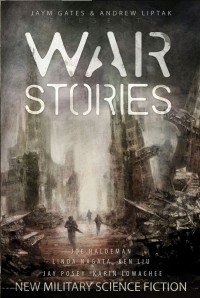The Hardest Part/Coming to Town: Jaym Gates on War Stories
← November newsletter: Garth Stein and NC Specualtive Fiction Night, and (in December) Julia Elliott and Fred ChappellFriday Quick Updates: NC Speculative Fiction Night is tomorrow! →
The Hardest Part/Coming to Town: Jaym Gates on War Stories
Posted on 2014-11-20 at 21:40 by montsamu
It’s been a long time since we had a true “NC Speculative Fiction Night” and for the return of the reading series this Saturday, November 22 at Quail Ridge Books, you can blame Jaym Gates as instigator. As she has been as long as I’ve known her, she’s been a busy author and editor of late — most recently and notably a story in Kaiju Rising: Age of Monsters and co-editing the anthology of which this essay speaks — not to mention her continuing work as the Communications Director for SFWA and several armloads of other projects which she juggles while on horseback, herding rescue dogs away from wildfires. In a pair of badass boots. And probably a corset. Jaym is a force of nature, our very own Kaiju of awesome, and I’m looking forward to settling down with War Stories over the winter months even more after reading her essay. I hope it inspires you to read or write or, as Jaym suggests half-way through, possibly even edit.
By Jaym Gates:
Andrew Liptak and I came up with the idea for War Stories at ReaderCon a couple of years ago, but we’d already been individually noodling on the idea for a while, so once the sparks were struck, the whole thing ran like a freight train. By the time we were done, we’d read over 900,000 words of slush (in other words, about 10 books of short stories), gone through many rounds of wrangling on which ones we were going to accept or reject, an equal number of editorial rounds, lost years off of our lives over the Kickstarter, and were near wrecks with worry over whether or not we’d done good.
See, there’s not really a ‘hardest’ part with a good anthology … there are lots of hardest parts.
There’s the slush. If you get a lot of it, well, that’s a lot of reading. If you don’t get a lot, you worry and try to chase down other stories. If your slush pile is really high quality—and ours was—you go through the agony of trying to decide which stories to reject. That’s the thing I think I hate the most—having to choose between the stories. Andrew and I wanted to accept about 150k, but only had room for about half of that.
There’s the heartbreak. Several of our authors and submitters were veterans who used real life experiences in their stories. Others simply captured it so well that they might as well have been there. It’s absolutely legitimate to break down in tears while reading slush, thank you very much.
And, once you’ve chosen what stories to accept, the editing. Oh, the editing. How do you edit someone’s real life experiences? How do you make sure that you’re correct on something with as big, complex, and multifaceted as war? How do you balance politics and world views? What’s the relevance of this now? In ten years? In thirty?
With War Stories, we also knew that there was a chance that this would end up with actual military and government interest (although we underestimated how much, and how quickly), so we also had to try and balance reality, potential, and far-future concerns. Ethics were a consideration, too.
But if you’re reading this and thinking, “Hey, that actually sounds like it was all kind of awesome,” well, it was, and also, you might want to consider editing something.
Because here’s the thing about editing: it’s the best. We got to choose a handful of stories with something to say about the future, and polish them to their rightful shine, and now we get to share them with you.
So maybe, if anything, the hard part is not running up to someone, grabbing them by the shirt, and yelling “Did you see this thing we made? Aren’t these authors awesome? You have to read this one now!”


